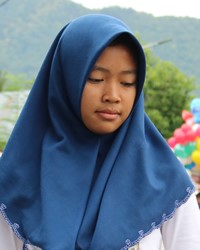Enrekang in Indonesia

Photo Source:
Copyrighted © 2026
Herwin Bahar - Shutterstock All rights reserved. Used with permission |
Send Joshua Project a map of this people group.
|
| People Name: | Enrekang |
| Country: | Indonesia |
| 10/40 Window: | Yes |
| Population: | 99,000 |
| World Population: | 99,000 |
| Primary Language: | Enrekang |
| Primary Religion: | Islam |
| Christian Adherents: | 0.01 % |
| Evangelicals: | 0.00 % |
| Scripture: | Portions |
| Ministry Resources: | No |
| Jesus Film: | Yes |
| Audio Recordings: | No |
| People Cluster: | Bugi-Makassar of Sulawesi |
| Affinity Bloc: | Malay Peoples |
| Progress Level: |
|
Introduction / History
The Enrekang are sometimes known as the Endekan or the East Endekan people. They live in the foothills around the regencies of Enrekang and Pinrang in the province of South Sulawesi. The Enrekang are part of a larger linguistic grouping called the Masenrempulu which also includes the Duri, Maiwa and Malimpung. The culture of the Enrekang has been influenced by its more populous and more powerful neighbors, the Toraja and Bugis people. The languages of Toraja and Bugis have influenced the Enrekang language and there are many similarities and a high degree of mutual intelligibility.
What Are Their Lives Like?
The primary means of livelihood for the Enrekang people is farming. Their main crops are rice, fruits and gula aren (sap from the sugar palm tree that is made into a brown sugar). Rice is their staple food. They also raise domesticated livestock such as water buffalo, goats and chickens to meet their needs. Small scale farmers work the land using a share-cropping system.
Many Enrekang marriages are still arranged by the parents and family elders. For several years after their marriage, a new couple lives with the wife's family. After they are established, the new family may move to live in their own house.
The traditional Enrekang house is raised on stilts that are three meters high. This is done as a protection from wild animal attacks. Both the walls and floors of the house are made from wooden planks. The enclosure below the house can also be used as a stall for livestock or as a storehouse.
What Are Their Beliefs?
Many Enrekang are devout Muslims. Thus, they believe that they will be judged according to their knowledge of the Qur'an (Islamic Holy Book) as well as the sum of their good deeds. The laws of traditional culture are still used and have been combined with Islamic law. Despite their professed loyalty to Islam, many Enrekang are still influenced by traditional animistic beliefs and superstitions. These beliefs are focused on the quest for protection through magic, by either appeasing or controlling both good and bad spirits. Burial ceremonies are still performed inside caves in the mountain slopes. Those accompanying the body must climb tall, steep mountainsides. The ceremony has the purpose of freeing the spirit of the deceased and giving the spirit power to move to the next world.
What Are Their Needs?
Several of the farmers in South Sulawesi do not have sufficient farmland. They work the land of rich landowners, who then take a large percentage of the crop. Farming in the Enrekang area is less than promising and as a result many Enrekang people leave the area to work as laborers in the cities and towns throughout Sulawesi and other parts of Indonesia. A greater range of jobs would help alleviate unemployment problems.
Prayer Points
Pray for Enrekang disciples to make more disciples who will make even more disciples.
Pray for Enrekang to have the spiritual hunger it takes to endure persecution and rejection to find their way to the King of kings.
Pray for the Lord to do miracles among them this decade!